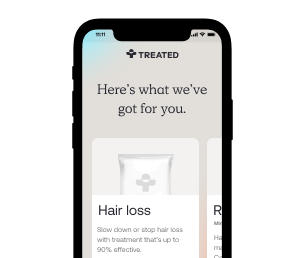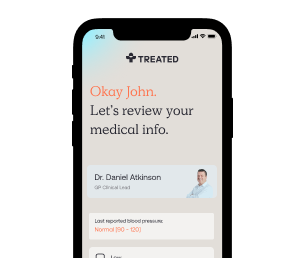Contraception
Let's help you find the one.
Pills, patches, rings. It’s easy to get lost with contraception. We can help you find treatment tailored for you.
Talk to us about your health, order contraception treatment online and get it delivered from our licensed pharmacy.
In a nutshell, contraception reduces your risk of getting pregnant. Certain types of hormonal birth control also have the added benefit of reducing some of the uncomfortable symptoms you may get around your period, and can make your period lighter and more regular.
You can take contraception for as long as you want to. Or you can switch methods or stop using it if you want to have a child. Some types of hormonal birth control are better for specific health issues or age ranges. So it’s good to check in with your clinician every now and then to make sure your birth control is still right for you.
Hormonal contraception is only available on prescription in the UK. Our clinical team will help you narrow down the best option because there are quite a few out there, and it’s not a one-size-fits-all type of deal.
There are four types of hormonal birth control that you take by yourself, and a few others where you’ll need a bit of guidance from a clinician or nurse before you use them.
At Treated, we offer both the combined oral contraceptive pill (COCP), which contains progestin and oestrogen, and the progestogen-only pill (POP), also called the mini pill. Pills need to be taken every day at around the same time to be most effective.
We also have the patch, which is applied to the skin like a plaster and changed once a week, and the vaginal ring, which is inserted into the vagina once a month.
Other types of birth control include the depo shot, the IUD (hormonal and non-hormonal) and the implant. You can’t use those without a clinician or nurse though so we don’t offer them. There are also condoms (for both men and women) and the diaphragm, which you can get at a pharmacy or sexual health clinic. These methods also protect against STIs.
It depends on you, really. If you like the comfort of taking something every day and knowing you’re protected, we recommend the combined pill or mini pill. If you’d like a more low-maintenance option, the weekly patch may be better. And if convenience is your thing, the monthly ring might be the way to go.
Formulations make a difference too. Some women prefer pills with a higher oestrogen dose, because it helps them with symptoms like vaginal dryness or low sex drive. Others prefer a lower oestrogen dose, because they’ll be less likely to get water retention or heavy periods.
The progestogen-only pill is good for women who can’t take oestrogen because of health factors, or who are breastfeeding.
So it’s very much a case of personal preference, and your health background. But we can talk you through all your options.

How we source info.
When we present you with stats, data, opinion or a consensus, we’ll tell you where this came from. And we’ll only present data as clinically reliable if it’s come from a reputable source, such as a state or government-funded health body, a peer-reviewed medical journal, or a recognised analytics or data body. Read more in our editorial policy.
All four of the main types of hormonal birth control (combined pill, mini pill, patch and ring) are over 99% effective when they’re used exactly right. That’s what clinicians call “perfect use”. This 99% effectiveness means that if 100 women use one of these types of birth control for one year, fewer than one will get pregnant.
“Typical” use is a bit less perfect and a lot more realistic. If you use contraception but make occasional mistakes, like forgetting a pill or putting a patch on too late, the effectiveness drops to between 91% and 94%. That means that six to nine women out of a hundred would become pregnant over the course of a year.
The best way to make sure your birth control is as effective as possible is to take it exactly as directed, which is why it’s important to find the method that works best with your lifestyle.
Hormonal birth control reduces your chances of pregnancy by changing the normal hormonal cycle in your body. It prevents ovulation, when the ovary releases an egg into your fallopian tube.
The hormones in birth control also keep the walls of your uterus from growing thicker with your cycle. When the uterine wall is thin, it’s more difficult for an egg to attach to it and grow.
The progestogen in hormonal birth control also changes the thickness of cervical fluid. This time, the hormones make it thicker. And sperm have a harder time making it through to an egg as a result.

How we source info.
When we present you with stats, data, opinion or a consensus, we’ll tell you where this came from. And we’ll only present data as clinically reliable if it’s come from a reputable source, such as a state or government-funded health body, a peer-reviewed medical journal, or a recognised analytics or data body. Read more in our editorial policy.

How we source info.
When we present you with stats, data, opinion or a consensus, we’ll tell you where this came from. And we’ll only present data as clinically reliable if it’s come from a reputable source, such as a state or government-funded health body, a peer-reviewed medical journal, or a recognised analytics or data body. Read more in our editorial policy.
Have something specific you want to know? Search our info below, or ask our experts a question if you can’t find what you’re looking for.
Family planning/ Contraception. Who.int.
Pregnancy protection. Help with PMS. Find the birth control pill that works best for you.
Skin plaster that works just like the combined pill. Slowly releases hormones into the body that prevent pregnancy.
The pill, but without oestrogen. Better option if you get migraines or side effects on combined birth control.
If you’re looking for birth control that’s low maintenance, the contraceptive ring could be just the one.

Registered with GMC (No. 4624794)
Meet Daniel
Registered with GPhC (No. 2202465)
Meet Sanjeda
Registered with GPhC (No. 2070724)
Meet Craig
Always read the leaflet that comes with your medication and tell us about any side effects you get.
We know health, but you know you.
Our experts tell you what’s safe, but you decide what’s best.
Answer a few questions and tell us about yourself. Get tailored advice from our clinicians so you can choose better.

Choose your treatment and how often you have it delivered.

We know things change. It’s the nature of life. We’ll check in regularly to make sure your treatment is still right for you.
Pause. Change. Skip. Start again. Any time you like.
Here are some other things we can help with.
Personalised advice. Effective antibiotic treatments to restore balance. Get the help you need for BV.
Treatments to make your period lighter and more manageable. We'll help you to find the right option for you.
Prevent unplanned pregnancy with emergency contraception. Highly effective Plan B treatments, delivered fast.
Event planned? Period due? Take period delay pills a few days before to delay your bleeding.
Get tailored advice from our expert team, and choose from a range of treatments to reduce symptoms.
All the info related to contraception you could ever need.
Take a look at our health guides.

On this page we’ll discuss which pills may be beneficial for your skin and acne symptoms, which aren’t and what to do if you take a pill that makes your skin worse.
Read more
Is there a genuine link between the pill and weight? Are certain pills more or less likely to affect your weight? And what can you do if you think the pill you’re currently taking is impacting your weight? We’ll delve into these questions and more, so that you feel confident when it comes to choosing a contraceptive to suit you.
Read more
Saying goodbye to a daily habit is always a big change, but knowing what to expect can help make coming off the pill a worry-free experience.
Read moreWe're making healthcare more about you. Sign up to our newsletter for personalised health articles that make a difference.
Disclaimer: The information provided on this page is not a substitute for professional medical advice, diagnosis, or treatment. If you have any questions or concerns about your health, please talk to a doctor.
We couldn't find what you're looking for.
Here's everything we treat. Or, if you're looking for something we don't have yet, you can suggest something.
If there’s a particular treatment or condition you’re looking for, tell us and we’ll look into it for you.
Submit your question here, or tell us if you’ve found an issue on our site.
We’ll get back to you very soon. We aim to respond to all queries in one working day.
You’re signed up to our newsletter. Keep an eye on your inbox for our latest update.
By clicking 'Subscribe now' you're agreeing to our Privacy Policy.
We’ve sent you an email asking you to confirm your email address.